Communication, Motivation, and Culture: A Tesco Case Study Report
VerifiedAdded on 2023/01/05
|14
|957
|45
Report
AI Summary
This report examines the interplay of culture, communication, and motivation within Tesco, a leading UK-based retail company. It explores different types of organizational culture, including power and role cultures, and references Handy's cultural theory. The report delves into the significance of effective communication and motivation, referencing Maslow's theory, in fostering a high-performance work environment. It highlights how Tesco prioritizes communication and motivation to achieve high customer satisfaction and financial results. The conclusion emphasizes the interconnectedness of these elements and their collective impact on organizational success, including job satisfaction, brand image, and a positive work environment.
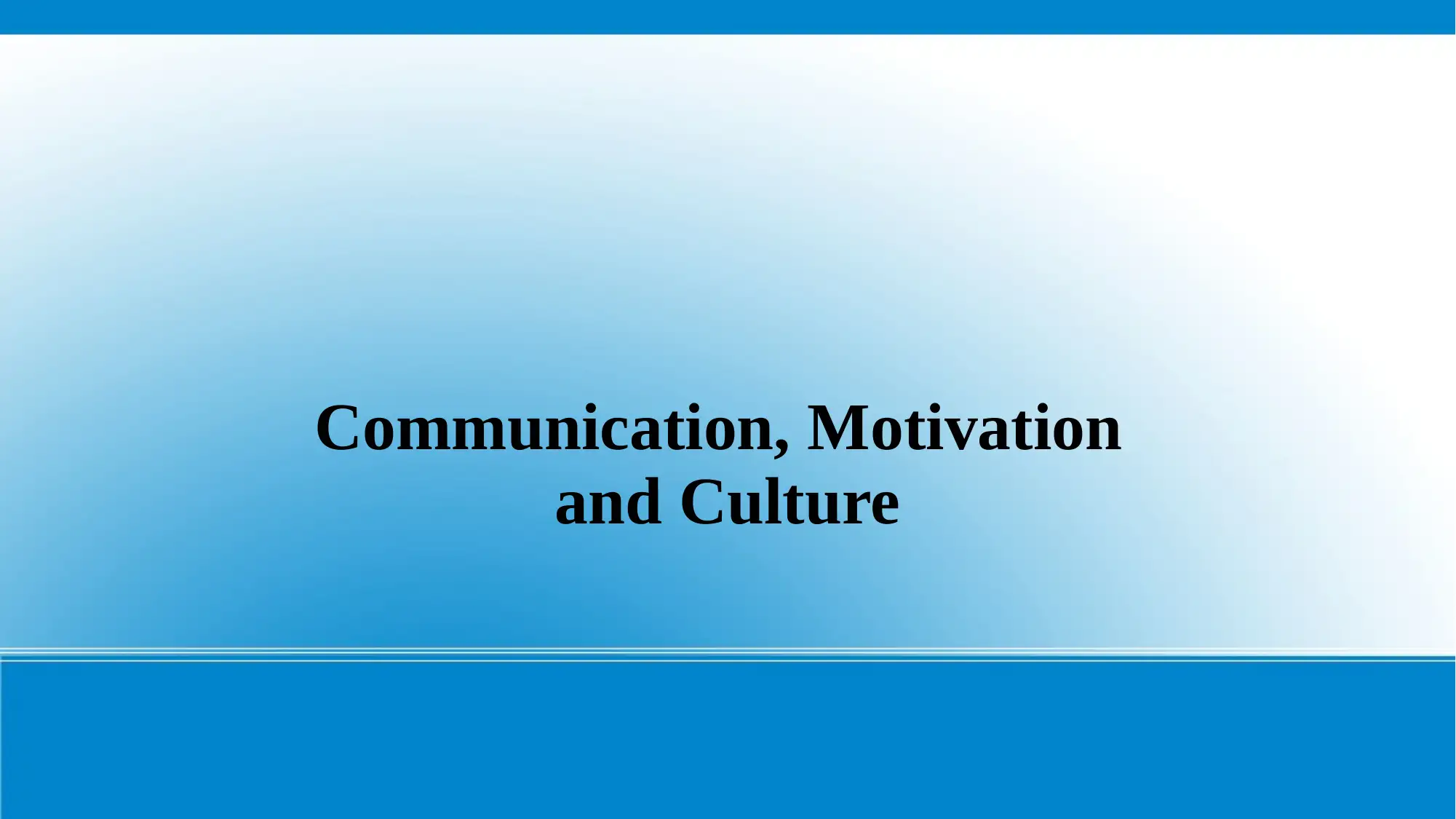
Communication, Motivation
and Culture
and Culture
Paraphrase This Document
Need a fresh take? Get an instant paraphrase of this document with our AI Paraphraser
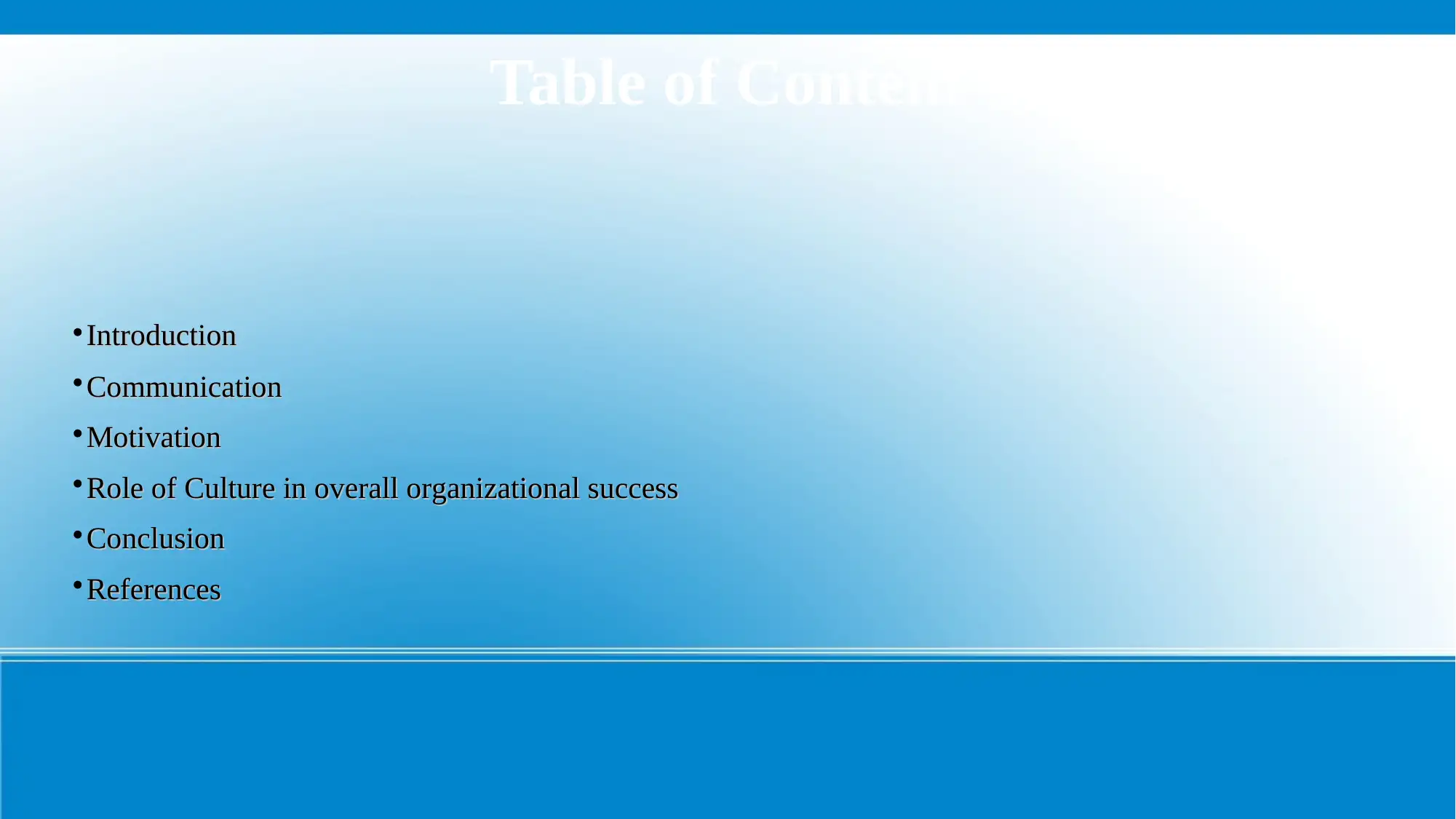
Table of Content
IntroductionIntroduction
CommunicationCommunication
MotivationMotivation
Role of Culture in overall organizational successRole of Culture in overall organizational success
ConclusionConclusion
ReferencesReferences
IntroductionIntroduction
CommunicationCommunication
MotivationMotivation
Role of Culture in overall organizational successRole of Culture in overall organizational success
ConclusionConclusion
ReferencesReferences
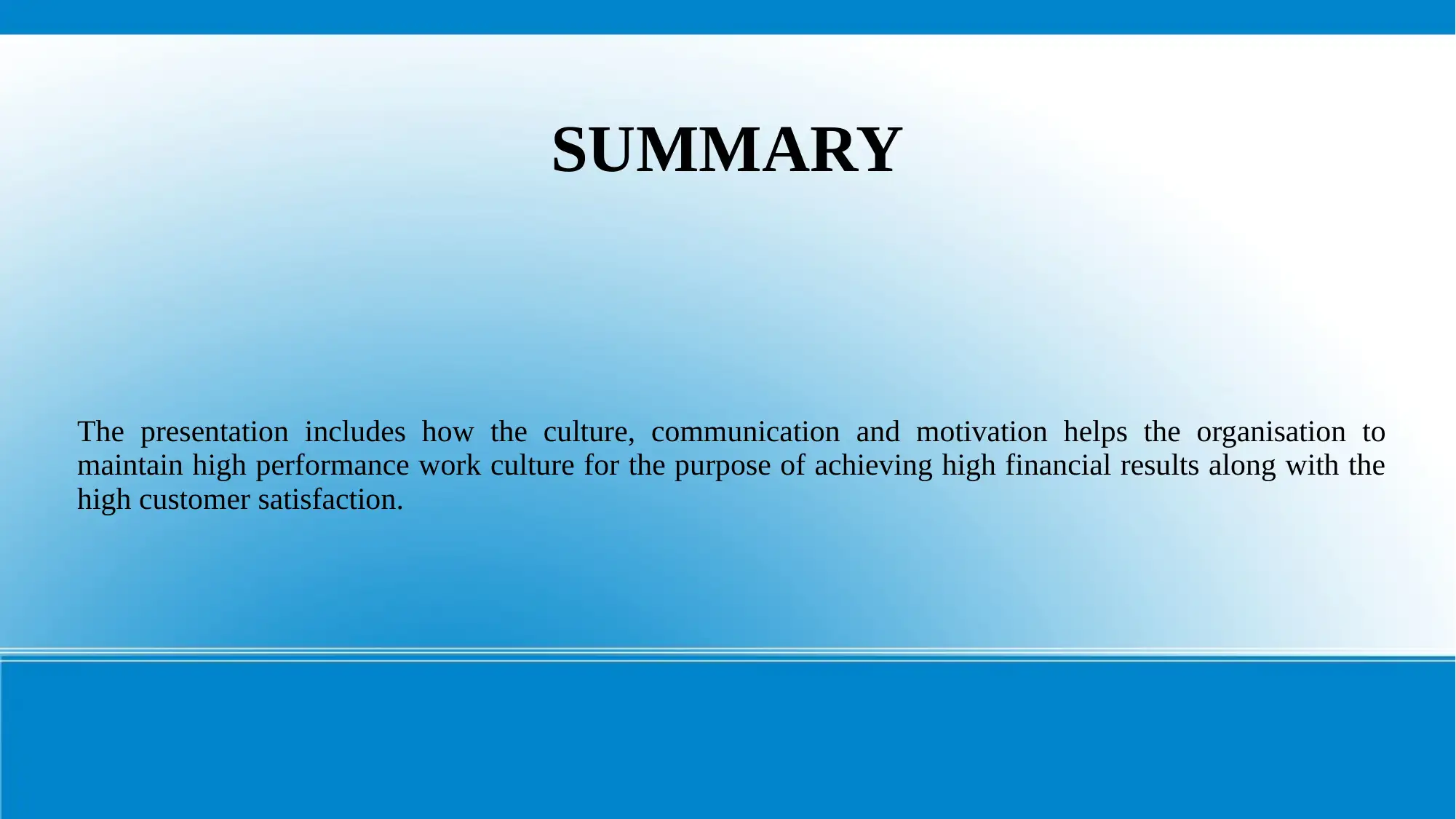
SUMMARY
The presentation includes how the culture, communication and motivation helps the organisation to
maintain high performance work culture for the purpose of achieving high financial results along with the
high customer satisfaction.
The presentation includes how the culture, communication and motivation helps the organisation to
maintain high performance work culture for the purpose of achieving high financial results along with the
high customer satisfaction.
⊘ This is a preview!⊘
Do you want full access?
Subscribe today to unlock all pages.

Trusted by 1+ million students worldwide
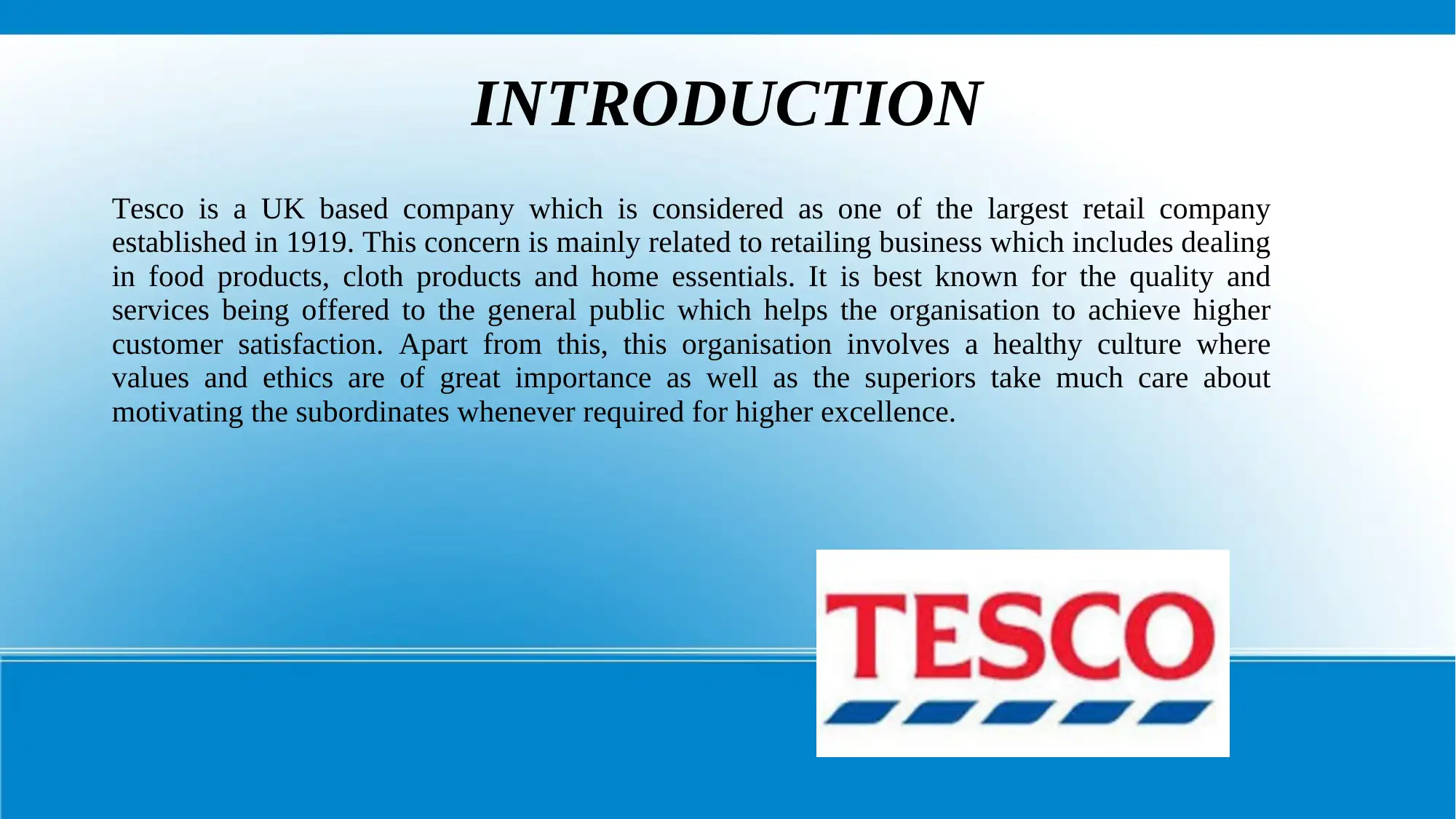
INTRODUCTION
Tesco is a UK based company which is considered as one of the largest retail company
established in 1919. This concern is mainly related to retailing business which includes dealing
in food products, cloth products and home essentials. It is best known for the quality and
services being offered to the general public which helps the organisation to achieve higher
customer satisfaction. Apart from this, this organisation involves a healthy culture where
values and ethics are of great importance as well as the superiors take much care about
motivating the subordinates whenever required for higher excellence.
Tesco is a UK based company which is considered as one of the largest retail company
established in 1919. This concern is mainly related to retailing business which includes dealing
in food products, cloth products and home essentials. It is best known for the quality and
services being offered to the general public which helps the organisation to achieve higher
customer satisfaction. Apart from this, this organisation involves a healthy culture where
values and ethics are of great importance as well as the superiors take much care about
motivating the subordinates whenever required for higher excellence.
Paraphrase This Document
Need a fresh take? Get an instant paraphrase of this document with our AI Paraphraser
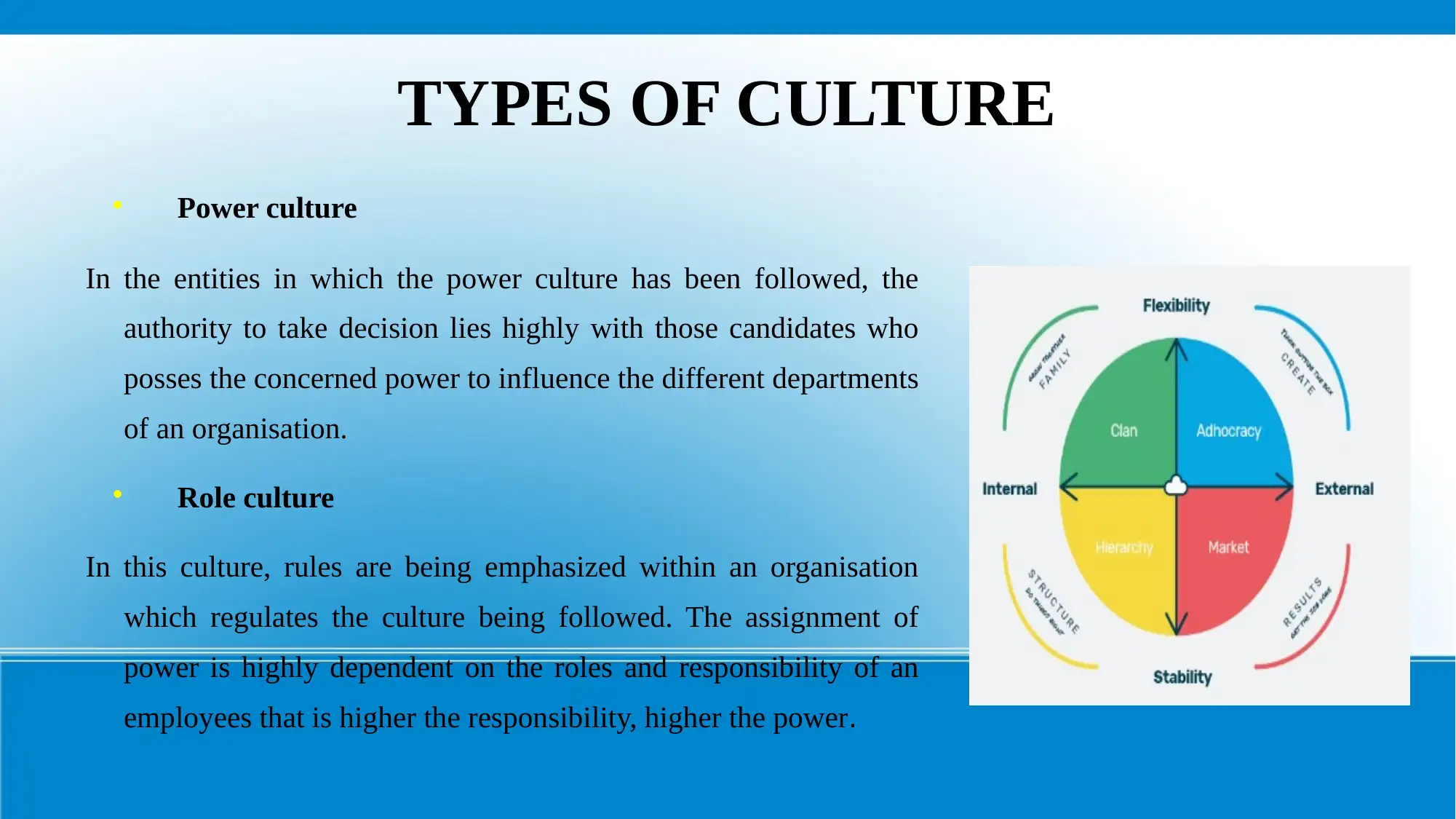
TYPES OF CULTURE
Power culture
In the entities in which the power culture has been followed, the
authority to take decision lies highly with those candidates who
posses the concerned power to influence the different departments
of an organisation.
Role culture
In this culture, rules are being emphasized within an organisation
which regulates the culture being followed. The assignment of
power is highly dependent on the roles and responsibility of an
employees that is higher the responsibility, higher the power.
Power culture
In the entities in which the power culture has been followed, the
authority to take decision lies highly with those candidates who
posses the concerned power to influence the different departments
of an organisation.
Role culture
In this culture, rules are being emphasized within an organisation
which regulates the culture being followed. The assignment of
power is highly dependent on the roles and responsibility of an
employees that is higher the responsibility, higher the power.
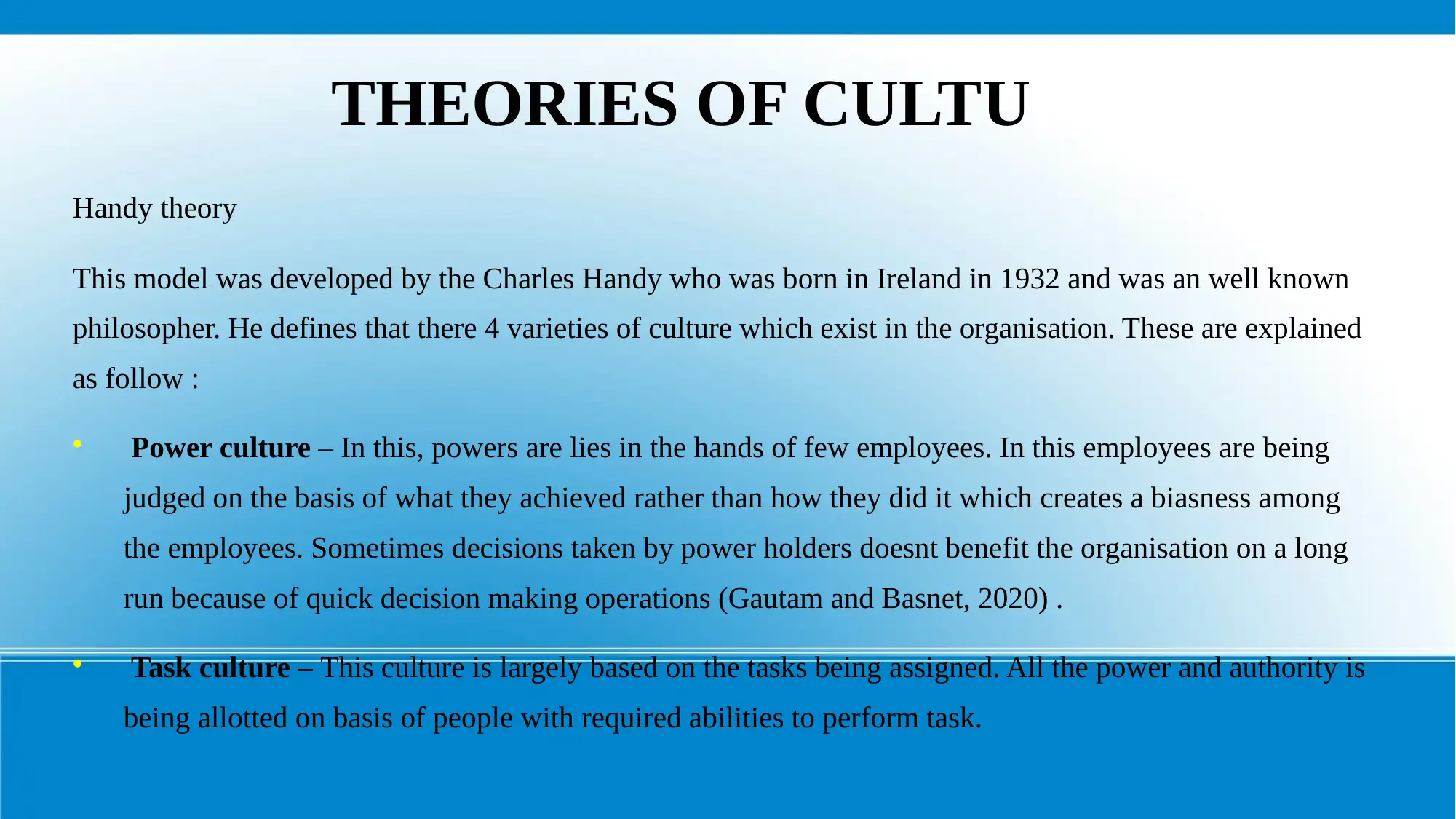
THEORIES OF CULTURE
Handy theory
This model was developed by the Charles Handy who was born in Ireland in 1932 and was an well known
philosopher. He defines that there 4 varieties of culture which exist in the organisation. These are explained
as follow :
Power culture – In this, powers are lies in the hands of few employees. In this employees are being
judged on the basis of what they achieved rather than how they did it which creates a biasness among
the employees. Sometimes decisions taken by power holders doesnt benefit the organisation on a long
run because of quick decision making operations (Gautam and Basnet, 2020) .
Task culture – This culture is largely based on the tasks being assigned. All the power and authority is
being allotted on basis of people with required abilities to perform task.
Handy theory
This model was developed by the Charles Handy who was born in Ireland in 1932 and was an well known
philosopher. He defines that there 4 varieties of culture which exist in the organisation. These are explained
as follow :
Power culture – In this, powers are lies in the hands of few employees. In this employees are being
judged on the basis of what they achieved rather than how they did it which creates a biasness among
the employees. Sometimes decisions taken by power holders doesnt benefit the organisation on a long
run because of quick decision making operations (Gautam and Basnet, 2020) .
Task culture – This culture is largely based on the tasks being assigned. All the power and authority is
being allotted on basis of people with required abilities to perform task.
⊘ This is a preview!⊘
Do you want full access?
Subscribe today to unlock all pages.

Trusted by 1+ million students worldwide
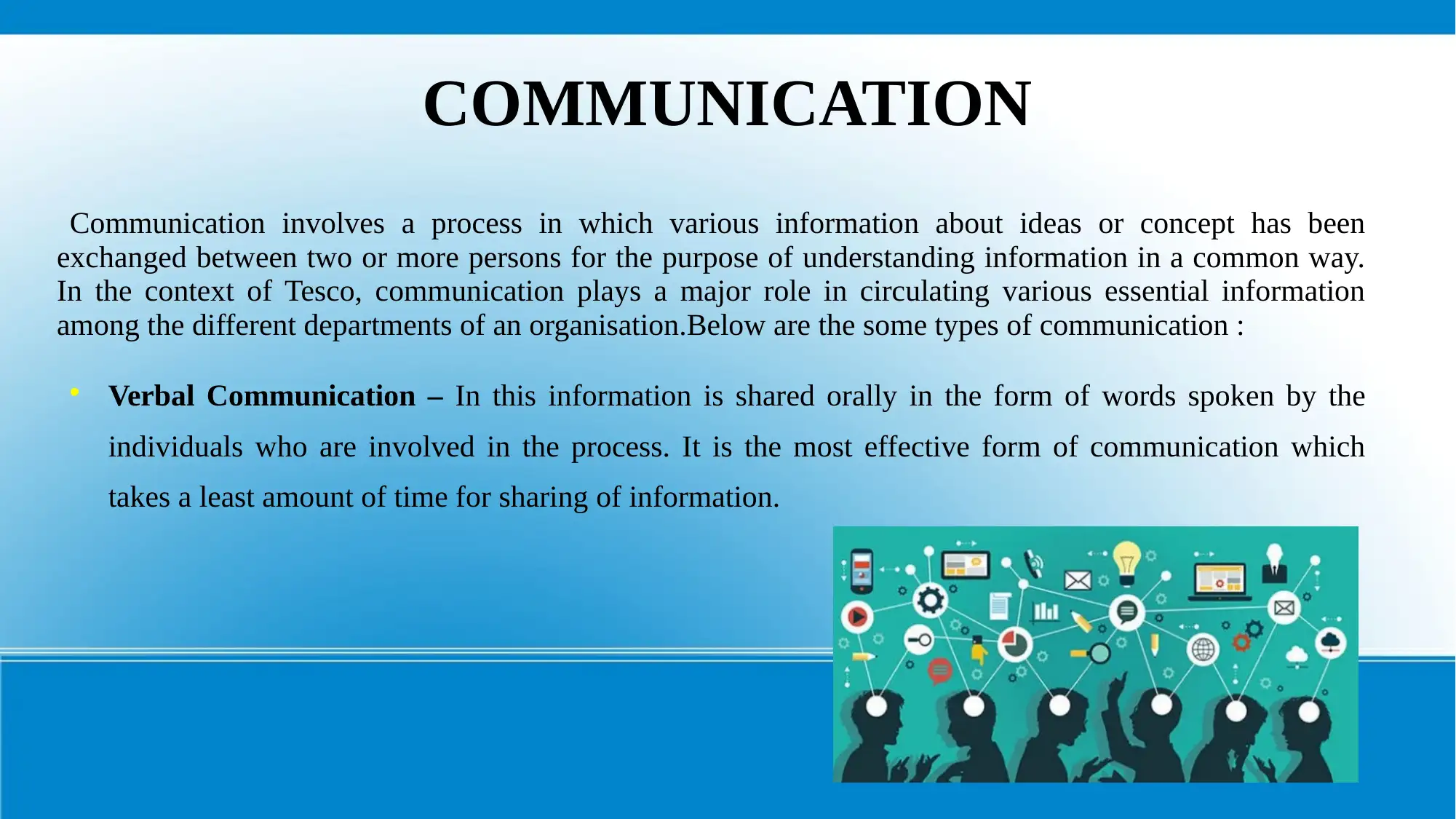
COMMUNICATION
Communication involves a process in which various information about ideas or concept has been
exchanged between two or more persons for the purpose of understanding information in a common way.
In the context of Tesco, communication plays a major role in circulating various essential information
among the different departments of an organisation.Below are the some types of communication :
Verbal Communication – In this information is shared orally in the form of words spoken by the
individuals who are involved in the process. It is the most effective form of communication which
takes a least amount of time for sharing of information.
Communication involves a process in which various information about ideas or concept has been
exchanged between two or more persons for the purpose of understanding information in a common way.
In the context of Tesco, communication plays a major role in circulating various essential information
among the different departments of an organisation.Below are the some types of communication :
Verbal Communication – In this information is shared orally in the form of words spoken by the
individuals who are involved in the process. It is the most effective form of communication which
takes a least amount of time for sharing of information.
Paraphrase This Document
Need a fresh take? Get an instant paraphrase of this document with our AI Paraphraser
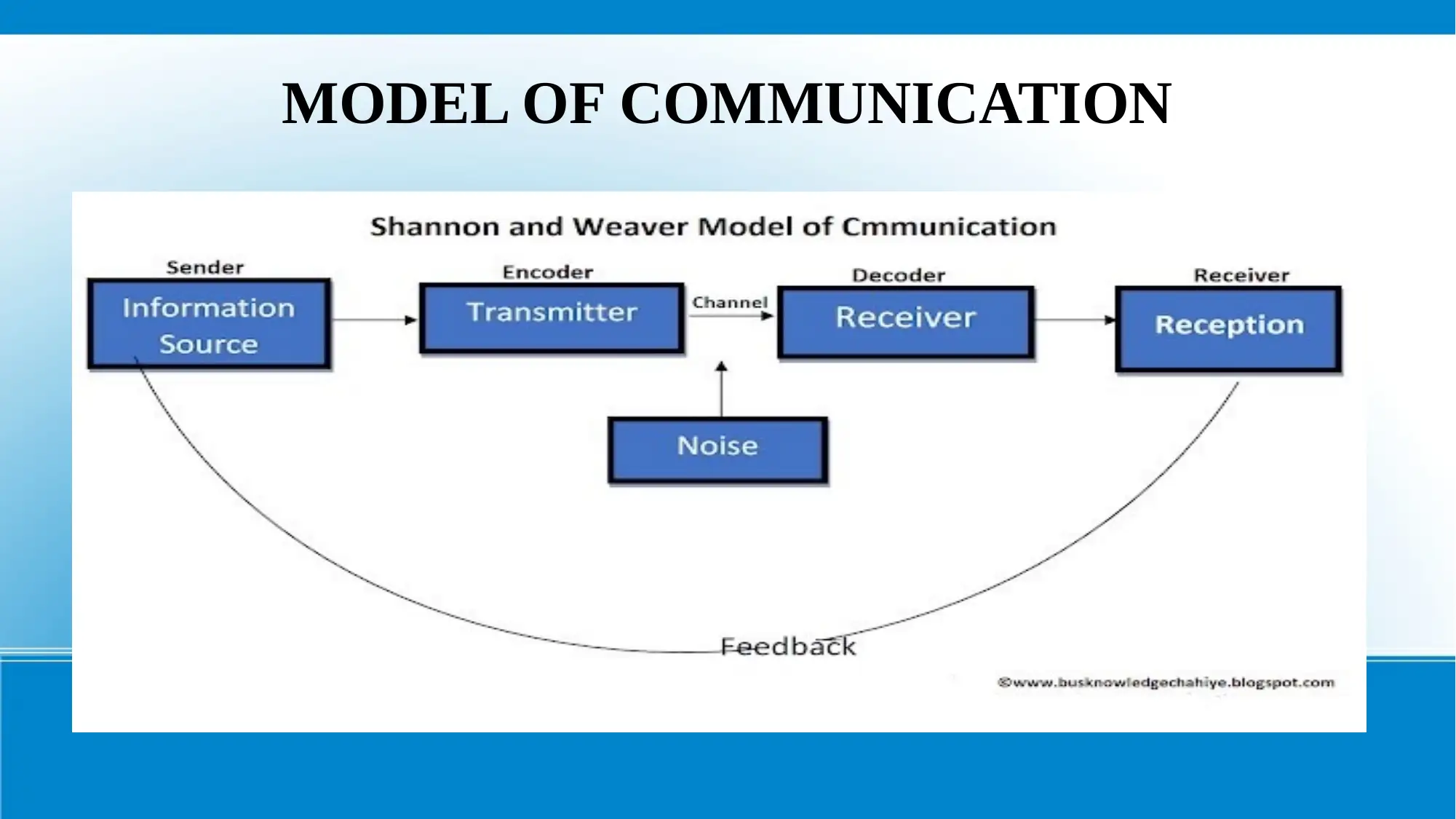
MODEL OF COMMUNICATION
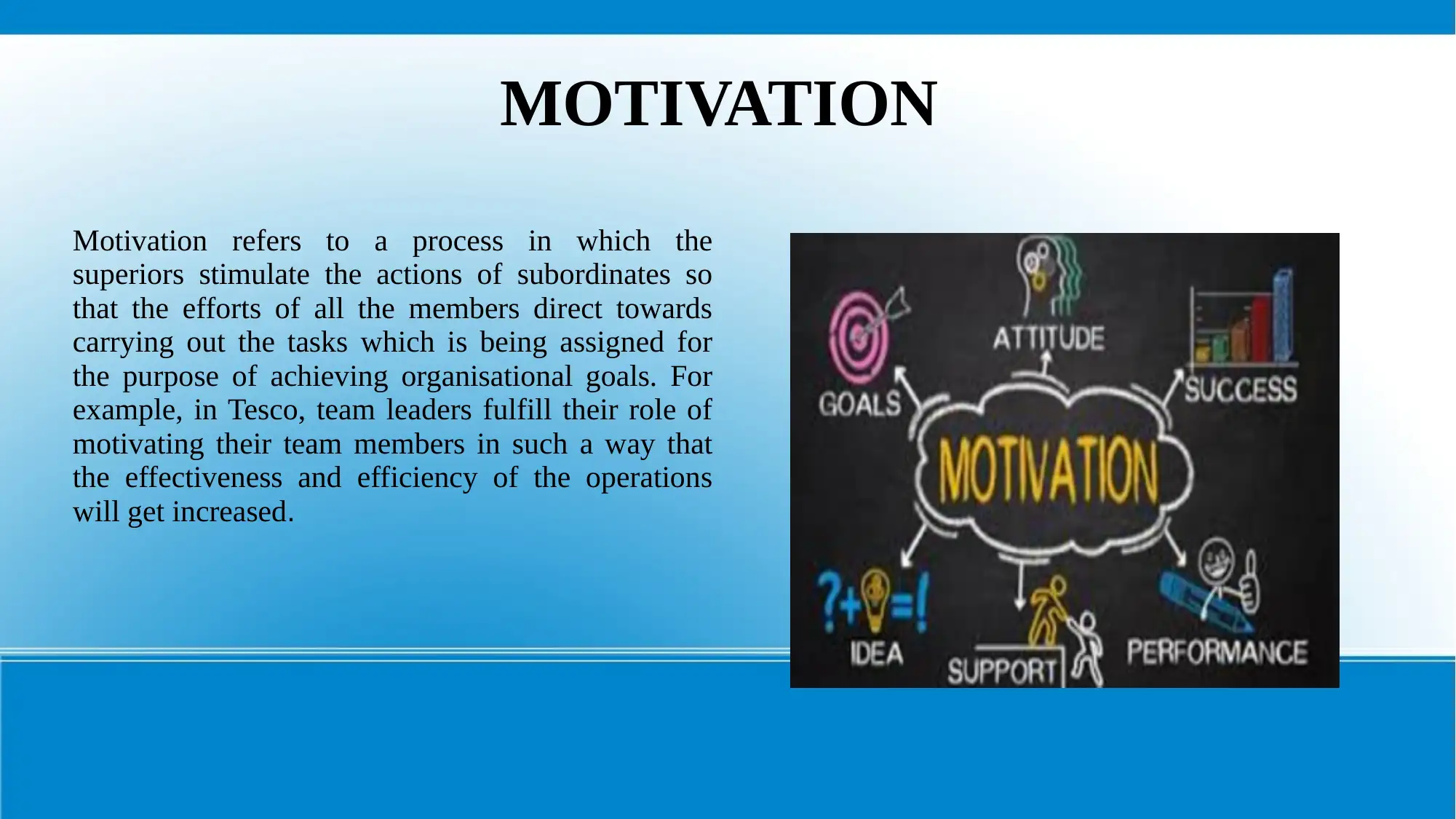
MOTIVATION
Motivation refers to a process in which the
superiors stimulate the actions of subordinates so
that the efforts of all the members direct towards
carrying out the tasks which is being assigned for
the purpose of achieving organisational goals. For
example, in Tesco, team leaders fulfill their role of
motivating their team members in such a way that
the effectiveness and efficiency of the operations
will get increased.
Motivation refers to a process in which the
superiors stimulate the actions of subordinates so
that the efforts of all the members direct towards
carrying out the tasks which is being assigned for
the purpose of achieving organisational goals. For
example, in Tesco, team leaders fulfill their role of
motivating their team members in such a way that
the effectiveness and efficiency of the operations
will get increased.
⊘ This is a preview!⊘
Do you want full access?
Subscribe today to unlock all pages.

Trusted by 1+ million students worldwide
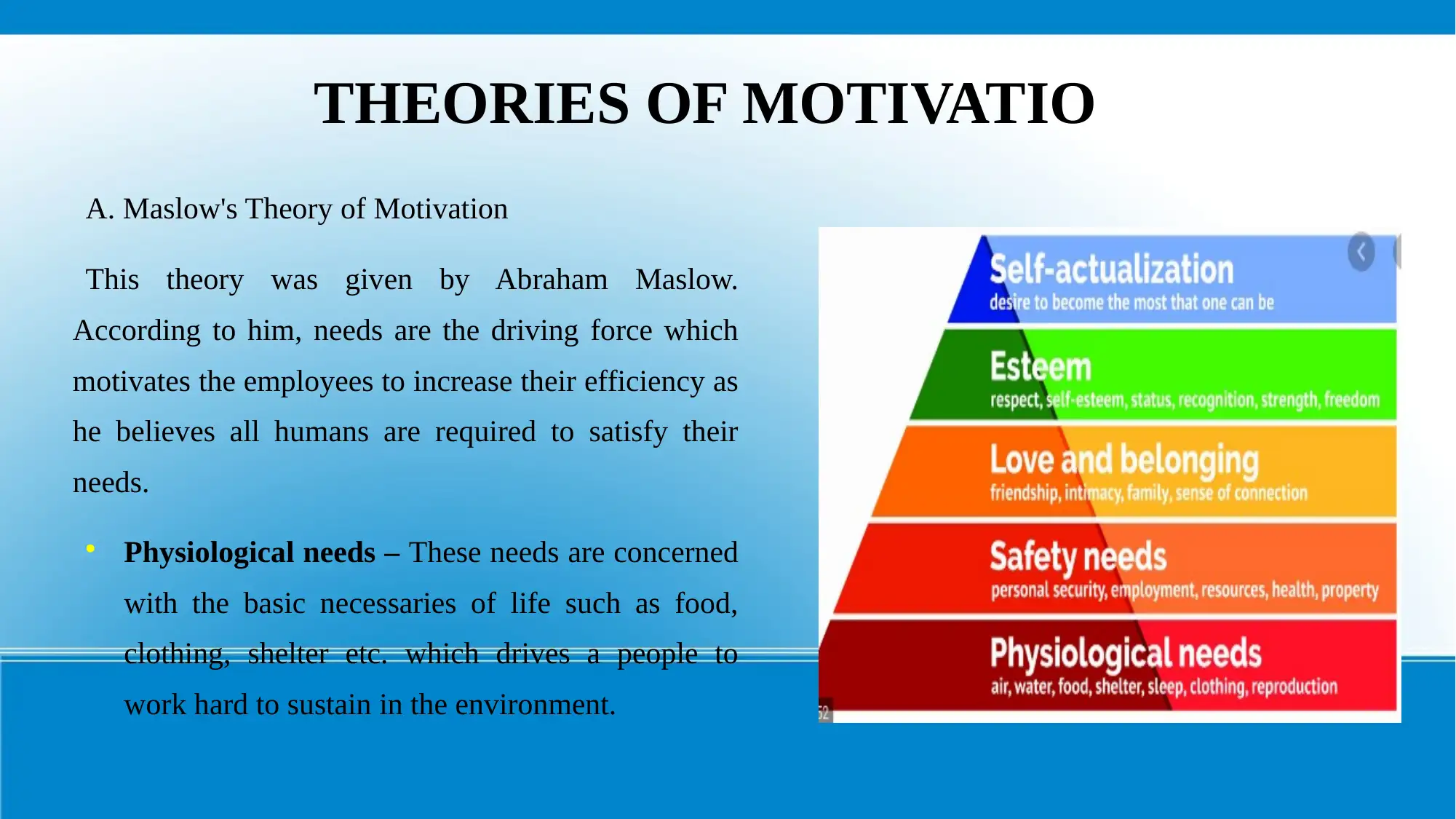
THEORIES OF MOTIVATION
A. Maslow's Theory of Motivation
This theory was given by Abraham Maslow.
According to him, needs are the driving force which
motivates the employees to increase their efficiency as
he believes all humans are required to satisfy their
needs.
Physiological needs – These needs are concerned
with the basic necessaries of life such as food,
clothing, shelter etc. which drives a people to
work hard to sustain in the environment.
A. Maslow's Theory of Motivation
This theory was given by Abraham Maslow.
According to him, needs are the driving force which
motivates the employees to increase their efficiency as
he believes all humans are required to satisfy their
needs.
Physiological needs – These needs are concerned
with the basic necessaries of life such as food,
clothing, shelter etc. which drives a people to
work hard to sustain in the environment.
Paraphrase This Document
Need a fresh take? Get an instant paraphrase of this document with our AI Paraphraser
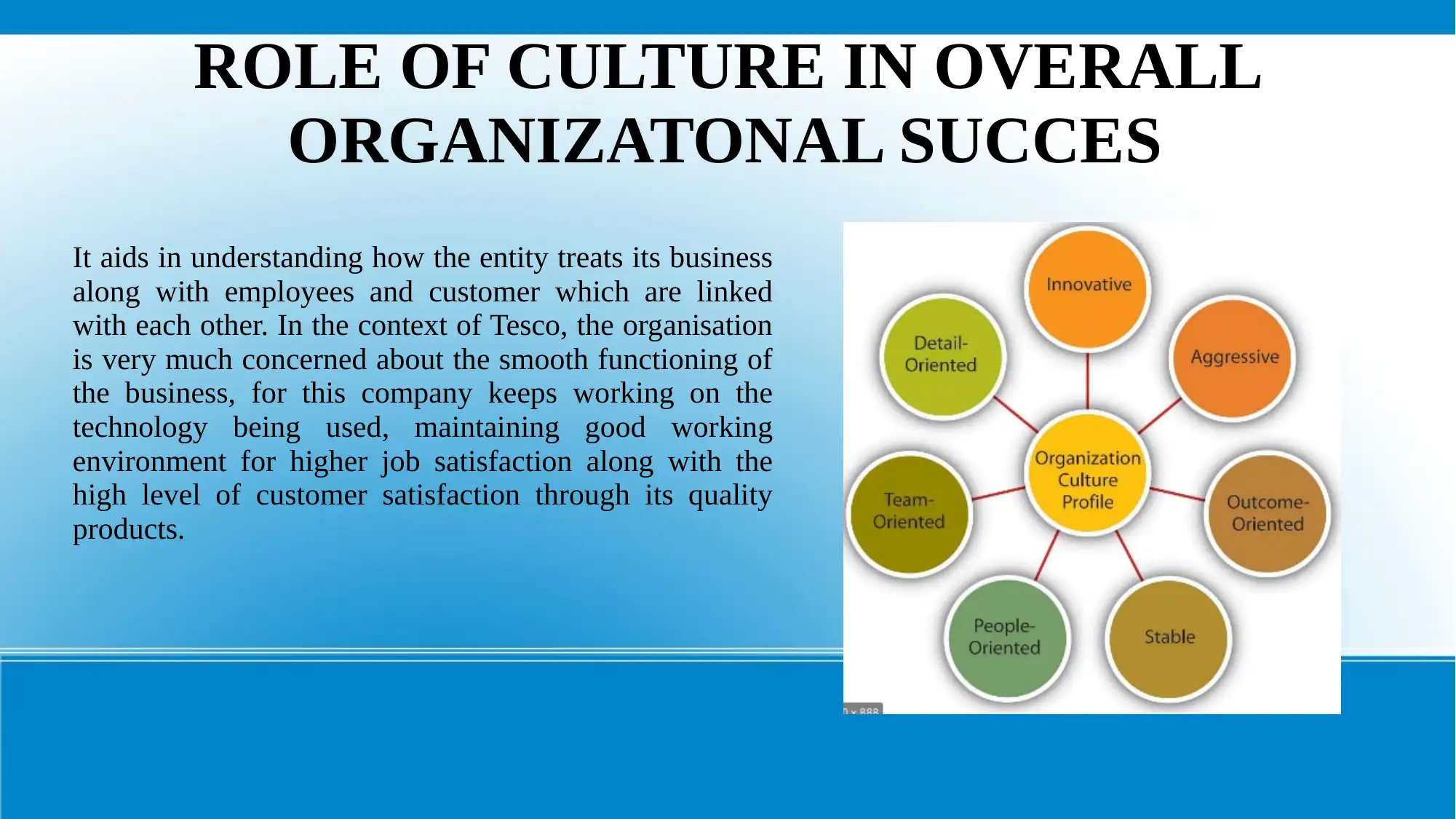
ROLE OF CULTURE IN OVERALL
ORGANIZATONAL SUCCESS
It aids in understanding how the entity treats its business
along with employees and customer which are linked
with each other. In the context of Tesco, the organisation
is very much concerned about the smooth functioning of
the business, for this company keeps working on the
technology being used, maintaining good working
environment for higher job satisfaction along with the
high level of customer satisfaction through its quality
products.
ORGANIZATONAL SUCCESS
It aids in understanding how the entity treats its business
along with employees and customer which are linked
with each other. In the context of Tesco, the organisation
is very much concerned about the smooth functioning of
the business, for this company keeps working on the
technology being used, maintaining good working
environment for higher job satisfaction along with the
high level of customer satisfaction through its quality
products.
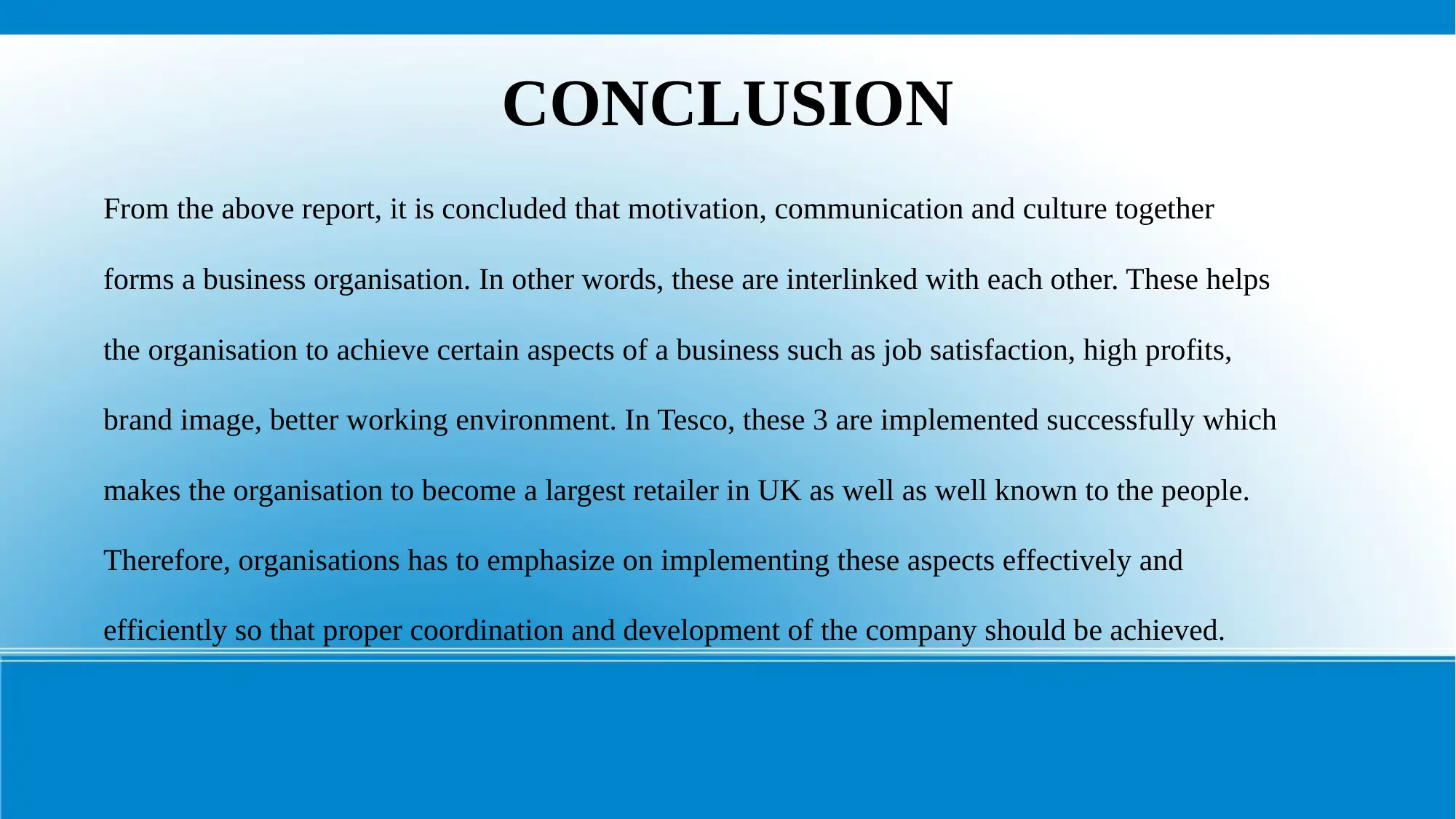
CONCLUSION
From the above report, it is concluded that motivation, communication and culture together
forms a business organisation. In other words, these are interlinked with each other. These helps
the organisation to achieve certain aspects of a business such as job satisfaction, high profits,
brand image, better working environment. In Tesco, these 3 are implemented successfully which
makes the organisation to become a largest retailer in UK as well as well known to the people.
Therefore, organisations has to emphasize on implementing these aspects effectively and
efficiently so that proper coordination and development of the company should be achieved.
From the above report, it is concluded that motivation, communication and culture together
forms a business organisation. In other words, these are interlinked with each other. These helps
the organisation to achieve certain aspects of a business such as job satisfaction, high profits,
brand image, better working environment. In Tesco, these 3 are implemented successfully which
makes the organisation to become a largest retailer in UK as well as well known to the people.
Therefore, organisations has to emphasize on implementing these aspects effectively and
efficiently so that proper coordination and development of the company should be achieved.
⊘ This is a preview!⊘
Do you want full access?
Subscribe today to unlock all pages.

Trusted by 1+ million students worldwide
1 out of 14
Related Documents
Your All-in-One AI-Powered Toolkit for Academic Success.
+13062052269
info@desklib.com
Available 24*7 on WhatsApp / Email
![[object Object]](/_next/static/media/star-bottom.7253800d.svg)
Unlock your academic potential
Copyright © 2020–2026 A2Z Services. All Rights Reserved. Developed and managed by ZUCOL.





